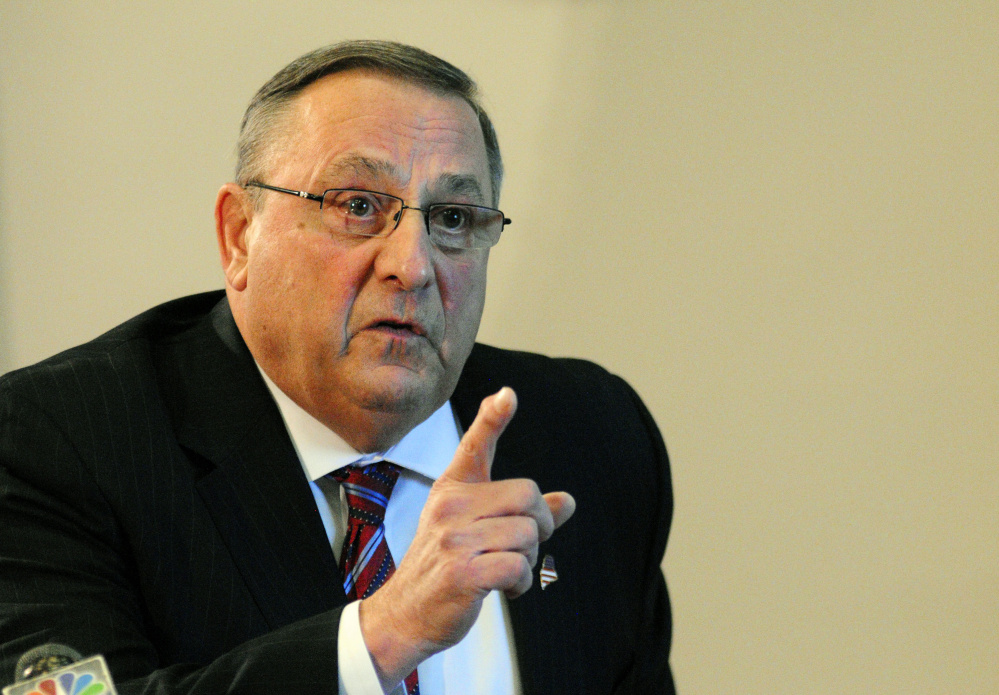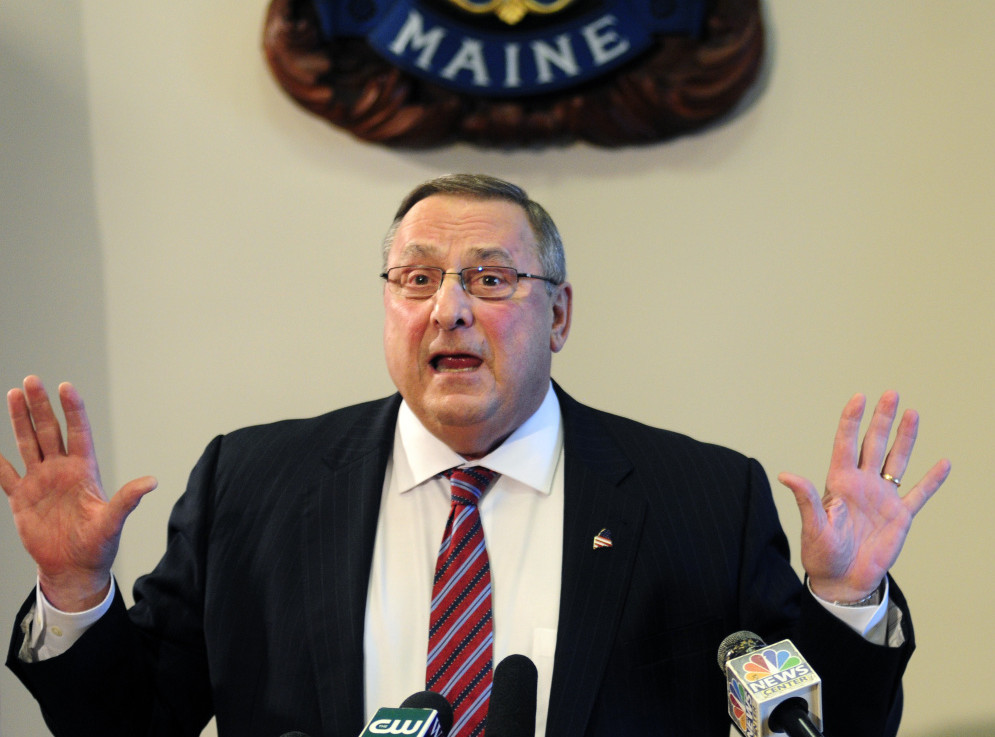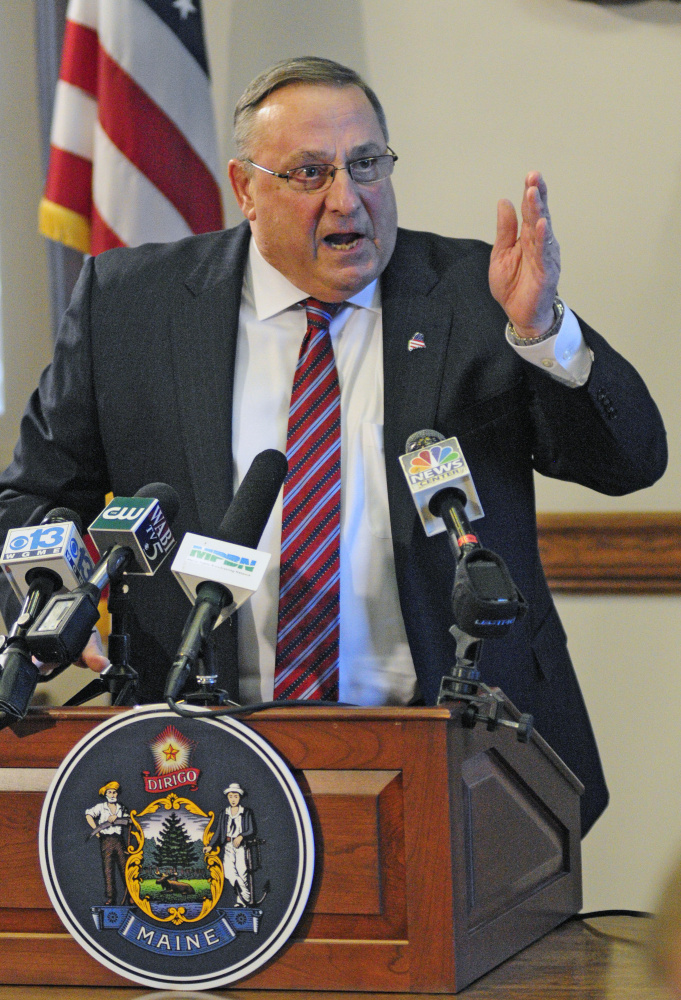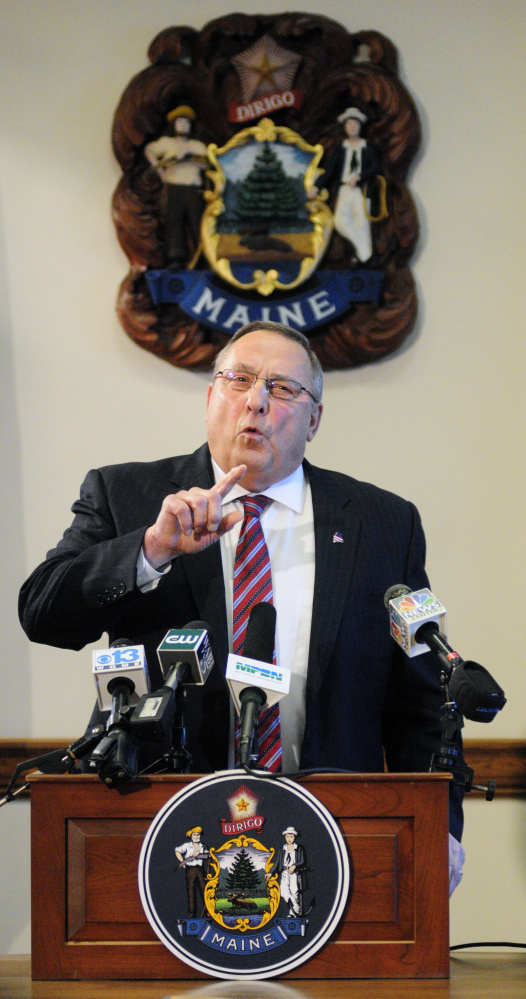AUGUSTA — Gov. Paul LePage responded Friday to the firestorm that erupted over his comment that drug dealers coming to Maine were impregnating young white girls, holding a news conference in which he admitted making “one slip” and blamed the media for implying that racism was inherent in the comment and not doing enough to fight the heroin crisis.
The governor apologized to women in Maine, saying his statement wasn’t intended to single out race or a particular group of women. He suggested that he isn’t “smart enough” to deliberately tap old racial tensions about black men and white women and blamed the media for making that connection in its coverage of his remark, which continued to ricochet across the national media landscape.
LePage’s comment has once again catapulted the Republican governor into the national spotlight, commanding attention from the New York Times and the Washington Post – as well as from obscure white supremacist websites.
LePage also said his comment about white women couldn’t have been racist because Maine’s population is predominantly white.
“Instead of saying Maine women, I said white women,” he said. “I’m not going to apologize to the Maine women for that because if you go to Maine, you will see we are 95 percent white.”
He later added, “I apologize again. My brain was slower than my mouth.”
LePage opened the 25-minute news conference by reaffirming his hostile relationship with the media.
“In one of the movies of ‘Rocky’ there’s a quote in there and I’ll just sort of paraphrase it,” he said. “‘Youz don’t like me and I don’t like you.’ I’m going to tell you that I sincerely mean that.”
He repeatedly blamed reporters for not “helping” his administration tackle the drug crisis, an issue that has dominated news coverage statewide and continues to be the focus of the legislative session.
Although the governor was highly critical of the media and the way it has covered the state’s heroin addiction crisis, he also asserted – as he has on numerous occasions – that he never reads Maine newspapers.
A review of the Portland Press Herald digital archive since January 2015 shows that the newspaper has published dozens of stories, editorials and guest opinion pieces on a range of topics related to heroin addiction and its impacts on the state.
They include profiles of addicts in recovery and the impact of addiction on their families; in-depth examinations of the explosive growth in overdoses and the struggle to provide access to medication that can save the lives of addicts; analyses of the lack of long-term treatment programs, resulting in longer waiting lists; LePage administration changes in the MaineCare program that reduced access to treatment for addicts who lack health insurance; the growth of diversionary programs in which police departments offer addicts access to treatment programs – many of them out of state – as an alternative to incarceration; and a detailed account of the trail that heroin follows from growers in Mexico through the hands of cartels, distributors and dealers to users in Maine.
LePage made his racially charged comment at a town hall meeting in Bridgton on Wednesday night, the latest in a series of weekly gatherings around the state that the governor has used to promote his policy agenda. About 30 minutes into the meeting, which was rebroadcast on a local cable TV channel Thursday night, LePage responded to a question about how he was tackling substance abuse in Maine. He began talking about how much of the heroin is coming into Maine from out-of-state drug dealers.
“These are guys with the name Dee Money, Smoothie, Shifty – these types of guys – they come from Connecticut and New York, they come up here, they sell their heroin, they go back home,” LePage told a large crowd. “Incidentally, half the time they impregnate a young white girl before they leave, which is a real sad thing because then we have another issue we have to deal with down the road.”
Sharda Sekaran, the managing director of communications for the Drug Policy Alliance in Washington, D.C., said the governor’s explanation “triggered the most cynical assumptions you have about a political leader.”
She said LePage’s comment has a historical link to a drug war “built on the foundation of racist thinking,” including an 1875 anti-drug law inspired by fears that Chinese railroad workers were luring white women into opium dens and a 1914 law banning cocaine amid racist fears about African Americans.
“The drug war has traditionally been the best buddy of racism, which LePage’s offensive comments vividly reflect,” Sekaran wrote in the Huffington Post on Friday.
In an interview, Sekaran said she wasn’t surprised LePage tried to “backpedal in reaction to the backlash about his statement, but “to pretend it’s innocuous to use the kinds of language he used, the implication was clear.”
Shay Stewart-Bouley, a Portland resident who writes a blog, Black Girl in Maine, said LePage’s comment stems from a mindset that Maine’s heroin problem should be blamed on others, in this case black people from other states. She doesn’t believe LePage when he claims he wasn’t referring to blacks when he mentioned drug dealers “Dee Money, Shifty and Smoothie.”
“Let’s be real,” she said. “Dee Money, Shifty and Smoothie are not white guys from West Falmouth.”
Stewart-Bouley said there’s no evidence that out-of-state, drug-dealing blacks are impregnating white women in Maine. She said LePage’s apology was intended for white women in Maine, and he didn’t apologize for disparaging an entire race.
Maine Republican Party Chairman Rick Bennett issued a statement after the governor’s news conference Friday, saying that the governor was right to acknowledge his mistake and “apologize for his ill-chosen words at his town hall earlier this week in Bridgton.”
He added, “It was also appropriate for him to refocus the discussion to the destructive impact of the heroin crisis in Maine, and the unfortunate consequences this crisis creates beyond those we see in daily news headlines.”
Several news outlets covered the Bridgton event, but didn’t report on the governor’s racially tinged remark. On Friday, LePage seized on the attending media’s decision not to cover his comment, accusing the media that eventually did of perpetuating its history of antagonist coverage of his tenure as governor. He singled out individual reporters, both for the questions they asked Friday and for previous stories. At one point he appeared to suggest that the media was somehow culpable in a drug epidemic that claimed more lives in the first nine months of 2015 than all of 2014.
“I tried in 2014 to get 10 drug agents and you guys did nothing to help us get those agents,” he told reporters. “Since then, since then, 400 Mainers have died.”
He went on to again accuse reporters of drawing a racist connotation from his remark.
“Am I perfect? No. Do I want to be perfect? No,” he said. “Because if I was perfect I’d be a reporter. I’m sorry I’m not like you guys. I’m not a polished speaker, but I have a heart, I have a heart for Maine and Maine people.”
He added, “And if you want to make it racist, go right ahead, do whatever you want.”
LePage bristled when he was asked how African-Americans would react to his comment.
“I didn’t say anything about white or black and the traffickers. Look, you’re reading things into what I didn’t say,” he said.
Asked about the names of the drug dealers he used during the town hall, he said, “What are they, black? I don’t know. I just read the names. I don’t see them because I don’t read your newspapers.”
When asked why he mentioned race at all, he said it was unintentional.
“It was all about Maine,” he said.
Steve Mistler can be contacted at 620-7016 or at:
smistler@pressherald.com
Twitter: @stevemistler
Send questions/comments to the editors.








